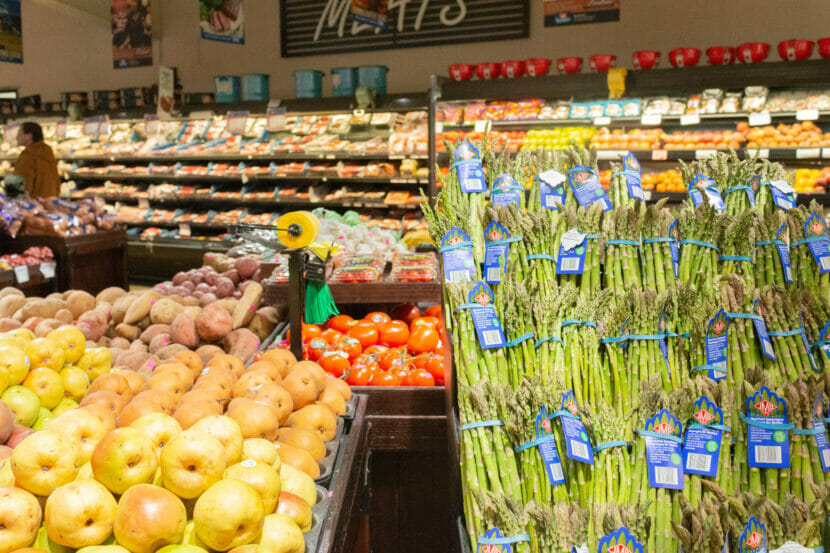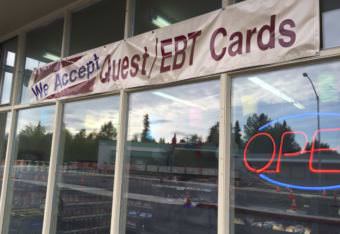
The state office that manages food stamps has been making progress working through a backlog delaying the benefits for thousands of Alaskans, but new problems have cropped up.
Most recently, advocates say the appeals process for denied or delayed applications is failing. Those advocates at the Alaska Legal Services Corporation are helping would-be food stamp beneficiaries in court hearings, and they say the state is still taking an unlawfully long time to approve applications.
The state had blamed the backlog on a cyberattack and a deluge of applications at the end of the official public health emergency for the COVID pandemic. But anonymous state workers told then-KTOO reporter Claire Stremple that budget cuts and understaffing had caused long waits for Alaskans desperate for food.
Stremple works for the Alaska Beacon now and spoke with Alaska Public Media’s Wesley Early about her continued reporting on food stamp issues in Alaska.
Listen:
This interview has been lightly edited for length and clarity.
Wesley Early: So can you walk us through this legal action over the backlog of food stamp benefits?
Claire Stremple: Yeah, that started early this year. So in January, a group of 10 Alaskans sued the Department of Health because they’d been waiting too long for food stamps. Food stamps are also known as SNAP (Supplemental Nutrition Assistance Program). It’s a federal program the state manages. But it has to manage it within certain parameters, like getting people’s paperwork done and their benefits to them within 30 days. And the state’s Department of Health wasn’t working anywhere near fast enough, hence the lawsuit. So as a result, in May, the state promised to cut its backlog in half within six months if the plaintiffs would agree to put the lawsuit on hold. And if they failed, then the lawsuit could continue. The great news is the state seems to have done that. The new director of the Division of Public Assistance, Deb Etheridge, manages the group that manages food stamps. She’s been working with staff to get through that backlog, which it turns out was huge. Federal numbers show the state was behind on as many as 19,000 applications, and they seem to have worked through the bulk of the backlog, and all of the recertifications.
Wesley Early: So it sounds like the state, after these lawsuits, realized how big of an issue the food stamps benefit was, and the scope of it.
Claire Stremple: It’s sometimes hard to tease out numbers because the state reports its status in a yearly format, which means it’s kind of hard to track improvement or when things aren’t going well. And so, they broke out month-to-month figures on their processing times for benefits, and it shows that they’ve really turned things around, but things were also really bad. At the height of the backlog, the state’s Division of Public Assistance was processing less than 10 percent of applications on time. So from December 2022 to April 2023, less than 10 percent of applications were getting processed in the lawful timeframe. So for four months, 90 percent of Alaskans who tried to get recertified for food benefits were waiting more than a month.
Wesley Early: And it sounds like there’s also legal help from the Legal Services Corporation. Can you describe that work?
Claire Stremple: What’s really interesting about this is it’s not just attorneys from Alaska Legal Services, but also a bunch of volunteers. And they helped nearly 2,000 people get fair hearings, which are basically an appeal to the state that says, “Hey. You’re late. That’s illegal. Please file my benefits.” And so the state does. And that helped people get their money for food, which is huge because some people were waiting for four or five months. One family that I talked about with a legal volunteer, the family was waiting several months and they ended up getting nearly $20,000 that the state owed them for food.
Wesley Early: Wow. And I understand that now, the appeals are the issue in getting benefits. Can you walk through those issues with appeals and delays in them?
Claire Stremple: So those fair hearings appeals that we were just talking about, they’re happening because there’s still delays in getting benefits while the state is getting back on track. But there’s short-staffing in the group of people that gets the appeals from the Department of Health to the Department of Administration that schedules them. It’s a little complicated, but the point is that Alaska Legal Services is really worried because they’re anticipating a lot more of these appeals for another reason. Nationwide, states need to check their Medicaid rolls to make sure everyone getting benefits still qualifies for them. And that’s because during the pandemic, no one lost benefits. They were on hold to make sure everyone had care. But now, that same department that’s struggling to get out of a backlog on food stamps has a bunch more paperwork to do for another kind of benefits. And those advocates are worried that we could see another backlog, this time for Medicaid.
Wesley Early: Well, it sounds like some people are starting to get their benefits. You mentioned the family that got $20,000 in benefits from the state. But even if they’re getting it now, retroactively I imagine a lot of damage has already been done.
Claire Stremple: Yeah. What I’ve been hearing from people who have gotten their benefits after an extended period is that, number one, they’re really grateful, they’re relieved and happy. And number two, they’re still kind of worried because of all the emergency things that they had to do to keep feeding their families, which really took a toll. People fell behind on rent and a lot of people racked up credit card debt, something I heard a lot about. And that comes with interest, and back benefits don’t come with interest. And so people are still going to be paying that back and dealing with those consequences for a long time.



